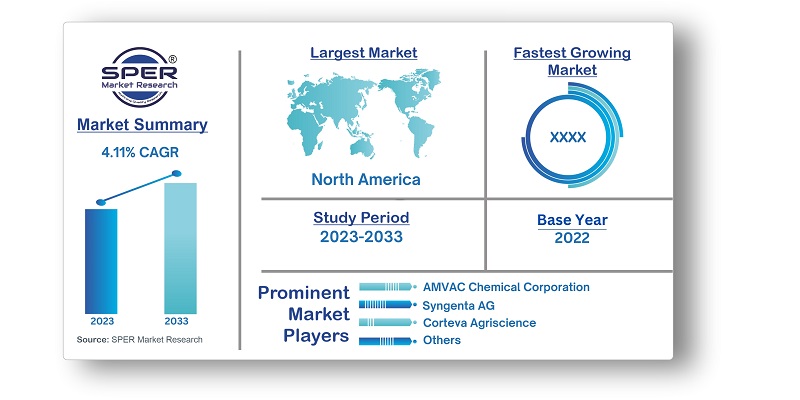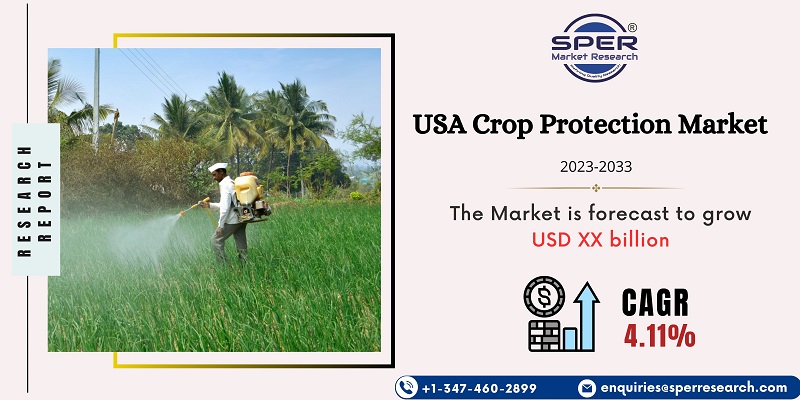
USA Crop Protection Market Growth, Size, Revenue, Trends, Share, Challenges and Future Outlook
USA Crop Protection Market Size- By Origin, Product Type, By Application- Regional Outlook, Competitive Strategies and Segment Forecast to 2033
| Published: Oct-2023 | Report ID: AGRI2346 | Pages: 1 - 106 | Formats*: |
| Category : Agriculture | |||
- January 2023: To create the next generation of crop protection products that are more environmentally friendly, Bayer worked with the agricultural biotech firm Oerth Bio.
- FMC introduced ZironarTM bio fungicide/bionematicide, a brand-new biological product, in May 2022. In addition to providing early-season defense against harmful fungi and soil nematodes, it also has a biostimulant impact that helps increase crop yields and plant health. FMC increased the scope of its technological investments to make sure it had access to advancements that increase its capabilities.


| Report Metric | Details |
| Market size available for years | 2019-2033 |
| Base year considered | 2022 |
| Forecast period | 2023-2033 |
| Segments covered | By Origin, Product Type, By Application |
| Regions covered | Eastern Region, Southern Region, Western Region, Northern Region |
| Companies Covered | AMVAC Chemical Corporation, Syngenta AG, Corteva Agriscience, BASF SE, FMC Corporation, Adama Americas Inc., UPL Limited, Sumitomo Chemicals America Inc., Marrone Bio Innovations Inc., and Bayer AG |
- Farmers
- Agricultural Retailers and Distributors
- Government Agencies and Regulators
- Agricultural Cooperatives
- Crop Consultants and Agronomists
- Research and Development Institutions
- Environmental and Consumer Advocacy Groups
- Agrochemical Manufacturers and Suppliers
- Exporters and Importers
| By Origin: |
|
| By Product Type: |
|
| By Application: |
|
- USA Crop Protection Market Size (FY’2023-FY’2033)
- Overview of USA Crop Protection Market
- Segmentation of Indonesia Crop Protection Chemicals Market By Origin (Synthetic, Bio-Based)
- Segmentation of Indonesia Crop Protection Chemicals Market By Product Type (Herbicides, Insectides, Fungicides, Others)
- Segmentation of Indonesia Crop Protection Chemicals Market By Application (Grains and Cereals, Oilseeds and Pulses, Fruit and Vegetables, Turfs and Ornamental, Commercial Crops, Others)
- Statistical Snap of USA Crop Protection Market
- Expansion Analysis of USA Crop Protection Market
- Problems and Obstacles in USA Crop Protection Market
- Competitive Landscape in the USA Crop Protection Market
- Impact of COVID-19 and Demonetization on USA Crop Protection Market
- Details on Current Investment in USA Crop Protection Market
- Competitive Analysis of USA Crop Protection Market
- Prominent Players in the USA Crop Protection Market
- SWOT Analysis of USA Crop Protection Market
- USA Crop Protection Market Future Outlook and Projections (FY’2023-FY’2033)
- Recommendations from Analyst
1.1. Scope of the report1.2. Market segment analysis
2.1. Research data source2.1.1. Secondary Data2.1.2. Primary Data2.1.3. SPER’s internal database2.1.4. Premium insight from KOL’s2.2. Market size estimation2.2.1. Top-down and Bottom-up approach2.3. Data triangulation
4.1. Driver, Restraint, Opportunity and Challenges analysis4.1.1. Drivers4.1.2. Restraints4.1.3. Opportunities4.1.4. Challenges4.2. COVID-19 Impacts of the USA Crop Protection Market
5.1. SWOT Analysis5.1.1. Strengths5.1.2. Weaknesses5.1.3. Opportunities5.1.4. Threats5.2. PESTEL Analysis5.2.1. Political Landscape5.2.2. Economic Landscape5.2.3. Social Landscape5.2.4. Technological Landscape5.2.5. Environmental Landscape5.2.6. Legal Landscape5.3. PORTER’s Five Forces5.3.1. Bargaining power of suppliers5.3.2. Bargaining power of buyers5.3.3. Threat of Substitute5.3.4. Threat of new entrant5.3.5. Competitive rivalry5.4. Heat Map Analysis
6.1. USA Crop Protection Market Manufacturing Base Distribution, Sales Area, Product Type6.2. Mergers & Acquisitions, Partnerships, Product Launch, and Collaboration in USA Crop Protection Market
7.1. USA Crop Protection Market Value Share and Forecast, By Origin, 2023-20337.2. Synthetic7.3. Bio-Based
8.1. USA Crop Protection Market Value Share and Forecast, By Product Type, 2023-20338.2. Herbicides8.3. Insecticides8.4. Fungicides8.5. Others
9.1. USA Crop Protection Market Value Share and Forecast, By Application, 2023-20339.2. Grains and Cereals9.3. Pulses and Oilseeds9.4. Commercial Crops9.5. Fruits and Vegetables9.6. Turf and Ornamentals
10.1. USA Crop Protection Market Size and Market Share
11.1. USA Crop Protection Market Size and Market Share By Origin (2019-2026)11.2. USA Crop Protection Market Size and Market Share By Origin (2027-2033)
12.1. USA Crop Protection Market Size and Market Share By Product Type (2019-2026)12.2. USA Crop Protection Market Size and Market Share By Product Type (2027-2033)
13.1. USA Crop Protection Market Size and Market Share By Application (2019-2026)13.2. USA Crop Protection Market Size and Market Share By Application (2027-2033)
14.1. USA Crop Protection Market Size and Market Share By Region (2019-2026)14.2. USA Crop Protection Market Size and Market Share By Region (2027-2033)14.3. Eastern Region14.4. Southern Region14.5. Western Region14.6. Norther Region
15.1. AMVAC Chemical Corporation15.1.1. Company details15.1.2. Financial outlook15.1.3. Product summary15.1.4. Recent developments15.2. Syngenta AG15.2.1. Company details15.2.2. Financial outlook15.2.3. Product summary15.2.4. Recent developments15.3. Corteva Agriscience15.3.1. Company details15.3.2. Financial outlook15.3.3. Product summary15.3.4. Recent developments15.4. BASF SE15.4.1. Company details15.4.2. Financial outlook15.4.3. Product summary15.4.4. Recent developments15.5. FMC Corporation15.5.1. Company details15.5.2. Financial outlook15.5.3. Product summary15.5.4. Recent developments15.6. FMC Corporation15.6.1. Company details15.6.2. Financial outlook15.6.3. Product summary15.6.4. Recent developments15.7. FMC Corporation15.7.1. Company details15.7.2. Financial outlook15.7.3. Product summary15.7.4. Recent developments15.8. FMC Corporation15.8.1. Company details15.8.2. Financial outlook15.8.3. Product summary15.8.4. Recent developments15.9. Others
SPER Market Research’s methodology uses great emphasis on primary research to ensure that the market intelligence insights are up to date, reliable and accurate. Primary interviews are done with players involved in each phase of a supply chain to analyze the market forecasting. The secondary research method is used to help you fully understand how the future markets and the spending patterns look likes.
The report is based on in-depth qualitative and quantitative analysis of the Product Market. The quantitative analysis involves the application of various projection and sampling techniques. The qualitative analysis involves primary interviews, surveys, and vendor briefings. The data gathered as a result of these processes are validated through experts opinion. Our research methodology entails an ideal mixture of primary and secondary initiatives.



Frequently Asked Questions About This Report
PLACE AN ORDER
Year End Discount
Sample Report
Pre-Purchase Inquiry
NEED CUSTOMIZATION?
Request CustomizationCALL OR EMAIL US
100% Secure Payment






Related Reports
Our Global Clients
Our data-driven insights have influenced the strategy of 200+ reputed companies across the globe.




















